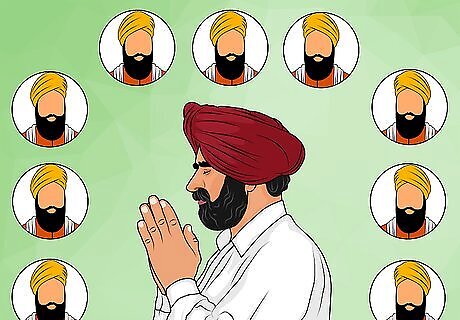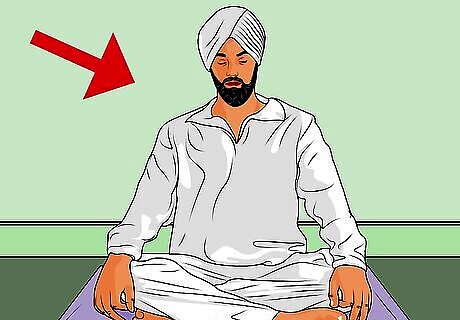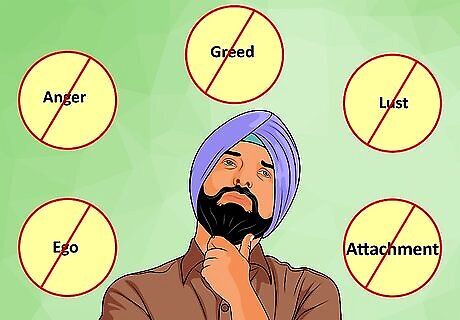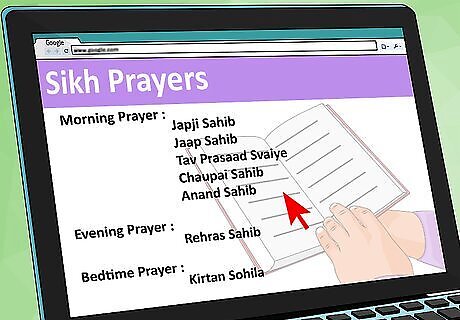
views
In addition, Sikhs are to lead moral lives, earn their living through hard work and honest means, and to share with others through charitable contributions and work.
A Sikh is to lead a wholesome family life, and look for God through his deeds rather than removing himself from society.

Know what it means to be a Sikh. Sikhs have an obligation to pray daily, work hard, and share with those in need.

Understand the definition. The word Sikh means disciple or student. Sikhs are the students of their ten teachers (or Gurus) who compiled their teachings into a unique collection of divine scriptures, called the Guru Granth Sahib.

Learn of the religion. Six Gurus wrote the Guru Granth Sahib, but it contains the writings of the Gurus and other religious teachers. The Guru Granth Sahib is considered a Living Guru.

Unite the past and present beliefs. There are, however, writings by followers of Sikhism from past and present that are worthwhile reading.

Go to a temple. If you live in India, it will be easy for you to attend a Gurdwara or Sikh temple. However outside India, attending a Gurdwara might be more difficult, unless you live in a large city. If you live near a Gurdwara, visit the local Granthi/Sikh custodian who can provide more information on the Sikh path.

Do not eat ritually killed meat. Some Sikhs are vegetarian because they have a great respect for animals. However, Sikhs are not bound to be vegetarian according to the Sikh Code of Conduct. The Sikh Code of Conduct states that ritually slaughtered meat or Kosher/Halal is forbidden. When Sikhs attend a Gurdwara, only vegetarian food is served. Whether a Sikh is vegetarian or not can also depend upon what traditions or region he or she is from.

Acknowledge the pervading spirit. Observe that there is only one all-pervading spirit (known as Akal or Ek Onkaar) that is formless and timeless. It is also almost difficult to know but not impossible. Akal is only realized through self knowledge, Sikhs therefore place emphasis on meditation to understand Akal. Sikhs aim to become one with Akal in order to end the cycle of birth and death, while not withdrawing from society.

Meditate. Sikhs also meditate for the purpose of realizing truth, as Akal (timeless spirit) is truth and truth is Akal. Sikhs know Akal through meditation, so they know truth through meditation. Guru Nanak said truth is only attainable through self realization. Self realization thus leads to enlightenment and ends the cycle of birth, death and rebirth.

Understand the five distractions. These are ego, anger, greed, lust and attachment. Sikhs believe these five distractions prevent one from achieving union with God, which is the ultimate goal. If you are to lead a good life free from suffering, you must avoid the five distractions.

Learn the teachings of Guru Nanak. He taught that one can only achieve union through devotion to Akal. Guru Nanak stated that rites, pilgrimages and asceticism and fasting are meaningless; devotion should come inwardly. Sikhs therefore should try to balance work, charity and worship. Sikhs have an optimistic view of life, a spirit of chardi kala. Sikhs also believe that they should defend and protect the rights of others. They should never endorse a class system, sexism, racism, or other stereotypes that support inequality.

Embrace charity. Charity is very important to Sikhs who balance charity along with work and worship. Charity is part of the Sikh belief in defending others and that can also mean defending others from poverty.

Partake in ritual recitations. Sikhs often recite parts of the Guru Granth Sahib daily and before/after certain activities. The part of the Guru Granth Sahib depends on the activity and is supposed to strengthen faith.

Celebrate your faith. Sikhs have a number of festivals. As a Sikh you attend these festivals as a sign of faith and to strengthen faith. Here are some Sikh festivals taken from Wikipedia, though there are more. Gurpurab are celebrations or commemorations based on the lives of the Sikh Gurus. They tend to be either birthdays or celebrations of Sikh martyrdom. All ten Gurus have Gurpurabs on the Nanakshahi calendar, but it is Guru Nanak Dev and Guru Gobind Singh who have a gurpurab that is widely celebrated in Gurdwaras and Sikh homes. The martyrdoms are also known as a shaheedi Gurpurab, which mark the martyrdom anniversary of Guru Arjan Dev and Guru Tegh Bahadur. Vaisakhi or Baisakhi normally occurs on 13 April and marks rebirth, the beginning of the new spring year and the end of the harvest. Sikhs celebrate it because on Vaisakhi in 1699, Guru Gobind Singh (the tenth guru) laid down the Foundation of the Khalsa as an Independent Sikh Identity. Bandi Chhor Divas celebrates Guru Hargobind's release from the Gwalior Fort, with 52 innocent Hindu kings who were also imprisoned by Jahangir, on 26 October 1619. Hola Mohalla occurs the day after Holi and is when the Khalsa Panth gather at Anandpur Sahib and display their warrior skills, including fighting and riding.

Pray. Sikhs pray once in the morning and twice in the evening consecutively, sometimes done in the Gurudwara and sometimes done at home. Names of the morning and evening prayers are below. Morning prayers include: Japji Sahib, Jaap Sahib, Tav Prasad Savaiye, Chaupai Sahib, Anand Sahib Evening prayer: Rehras Sahib Bedtime prayer: Sohila Sahib Here is a link to recordings of prayers: http://sgpc.net/live-kirtan-sri-harmandir-sahib-96-kbps/

Take part in a Sikh baptism. When a Sikh takes Amrit, he/she becomes pure or Khalsa. Khalsa members adhere to the five K's.

















Comments
0 comment